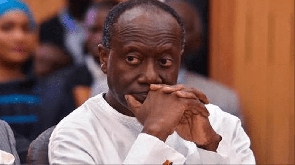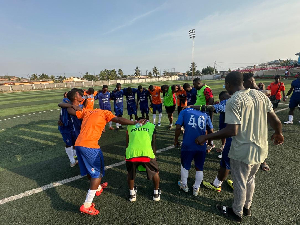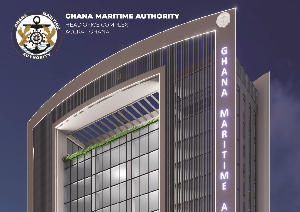Ahead of the parliamentary vetting of President Akuffo’s nomination to the Ministry of Finance, Ghana, an International Political Economist at the University of Texas at Dallas, John Taden, is urging the parliament's vetting committee to reject finance minister-designate, Ken Ofori-Atta’s nomination if he fails to answer certain critical questions of national interest. He made this call in light of the need for the parliament of Ghana to hold designated ministers to account for the stewardship in the NPP government's first administration.
Chief amongst these lingering questions according to Mr. Taden, are Ghana’s mounting debt and suspension of the Agyapa royalties transactions deal.
“While Ghana’s debt is skyrocketing with several businesses still reeling from the pandemic, there is no issue rifer with questions than the suspended Agyapa Royalties Transactions deal. Ken Ofori-Atta, as finance minister of the previous term, oversaw the crafting of a deal that will sell the rights to royalties of Ghana’s mines to an obscure company incorporated in a known British tax haven, Jersey.
Former Special Prosecutor Martin Amidu, anti-corruption risk assessment of the deal, noted that there was a breach in the public procurement and public financial management acts on how the transaction advisors and head-hunting firms were procured. Other profound conclusions from the report indicated that the deal was rife with opacity in which there was substantial suspicion of bid-rigging and corruption. He also concluded that the deal had the potential for illicit financial flows and money laundering. It is also worth noting that several civil society groups and international organizations called for a halt to the deal as it engendered more questions than answers.”
These are serious issues of concern that every Ghanaian deserves to have some closure to and if he is unable to respond to these issues then he is not prepared to lead the ministry," he indicated.
The Texas university lecturer also wants strict scrutiny as to why Databank, a business of the finance minister suddenly withdrew from offering its services to the deal.
“Ken Ofori-Atta’s company, Databank, was chosen as one of the advisors and head-hunting firms advising the Government on the agreement. Africa Legal Associates, another firm owned by a relative of the President, Gabby Okyere Darko, was chosen to advise on the deal. Indeed, there is nothing wrong with selecting Ghanaian-owned firms to advise on a deal of this proportion; it should be encouraged. However, when the chosen firms are owned by individuals who potentially have more knowledge of the specific budget and requirements of the project, the tendering process cannot be said to be fair. And by the way, why has Databank suddenly withdrawn from offering its services to the deal?”
John Taden is also concerned about the group of exclusive investors who would benefit from the pre-IPO discounted price of the new company a move he believes amounts to conflicts of interest.
“Before a company goes public on the stock exchange, it usually offers its shares to an exclusive list of investors who form part of the underwriters.
Databank and Africa Legal Associates, therefore, had the exclusive opportunity to benefit from the IPO. As shareholders, their goal would be to exact as much profit as possible from Ghana, whiles Ghana’s aim with the company would be to get as much value from the investors as possible. The conflicting nature of these interests implies that Databank and Africa Legal Associates cannot have both Ghana’s and their firm’s interests at heart”.
Taden is of the view that, in the event of malpractice, the President would have a harder time seeking the prosecution of his Finance Minister and cousin adding that the deal is skewed against Ghana re-emphasizing the former Attorney General’s position that individuals who are supposed to be working on the state’s behalf were rather the same individuals essentially representing the other parties of the deal.
He further expressed worry about how the Finance Minister-designate can continue to secure future loans on Ghana’s mines?
“Agyapa is not going to stop Ghana from borrowing. The 500 million dollars expected intake from the launching of the IPO is not even enough to construct an interchange in Accra. However, nobody can deny that Agyapa significantly undercuts the Government’s ability to demonstrate its ability to repay new loans. When you go into the international financial markets to borrow, the control of the flow of your resources and assets is used as a signal for your ability to pay back the loans. By surrendering the rights to the royalties through Agyapa, however, investors are going to be skeptical about Ghana’s ability to repay new loans and are therefore likely to place higher interest rates on any new lending. In the end, whatever benefits the Government is seeking with Agyapa could then be eroded with the risk of higher borrowing costs,” he added.
The Agyapa Gold royalties deal has been met with several criticisms with Civil Society Organizations, describing it as lacking transparency.
President Akufo-Addo’s recent announcement that the deal will be returning to parliament has sparked another wave of conversation among anti-corruption crusaders.
Executive Director of the Integrated Social Development Centre (ISODEC), Dr. Steve Manteaw at a recent press conference in Tamale, urged Ghanaians to rise and ensure that Ghana’s royalties are not misused.
“Agyapa has no transparency provisions and does not have mandatory requirements in terms of how to use the benefits of our mineral royalties such as we have in our Petroleum Management Act,” he added.
General News of Wednesday, 24 March 2021
Source: Sandra Esinam Afenu, Contributor
Reject Ofori-Atta if he fails to answer critical questions on Agyapa – Political Economist
Entertainment












